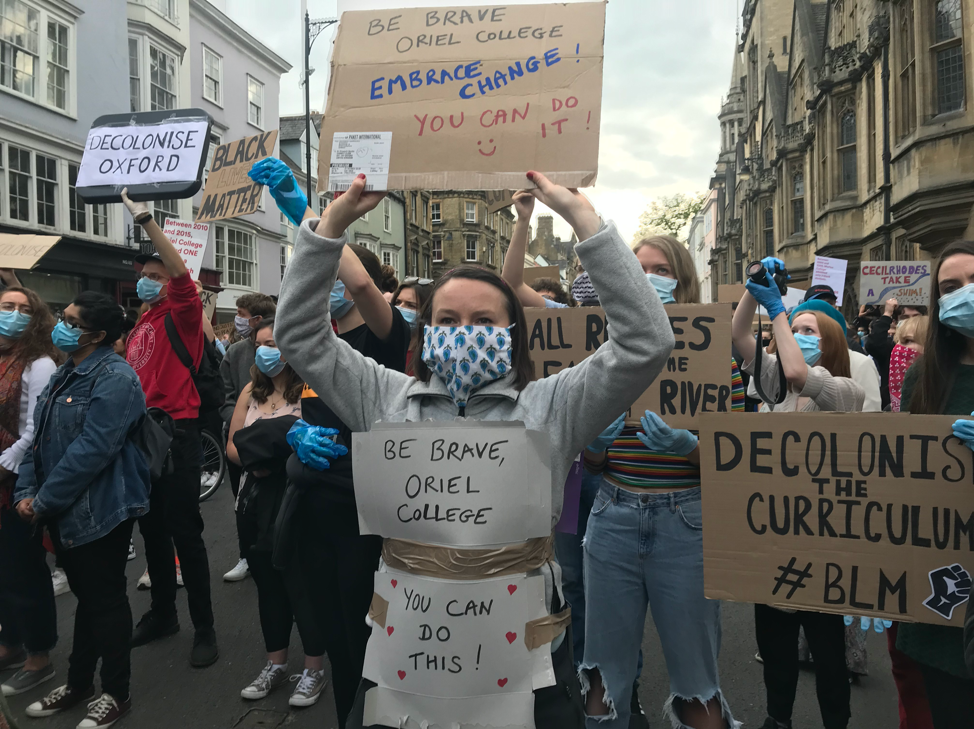Over a thousand people, of every college, faculty, and ethnicity, gathered on Tuesday to peacefully protest the statue of 19th century colonialist Cecil Rhodes mounted on the façade of Oriel College.
An Oriel student, Esther Agbolade questioned, “how can I go to a college like this?” She described her experience living within Oriel grounds, looking out her window and “making eye contact” with the statue. An online petition with some 150,000 signatures, describes it as synonymous with “colonialism, racism and patriarchy”. “You cannot expect me as a black student to endorse a statue like that up there” says Agbolade, “if you like history put it in a museum”. She added that the maintenance of the statue was proof that “you really don’t care about black students”.
The support for the movement was by no means limited to black students, with a diverse crowd in attendance to show their support for Rhodes Must Fall. One speaker stated, “Colonialism isn’t just Britain’s past, it’s Oxford’s present”.

The crowd chanted “take it down” and “decolonise”, accompanied with speeches of impassioned support from a wide variety of groups – and an 8 minute 46 seconds silent sit down in solidarity with George Floyd, as “that’s how long they knelt on his neck”.
A recent statement from the Oriel College governing body said it “abhors racism and discrimination in all its forms” and is “deeply committed to equality within our community at Oriel, the University of Oxford and the wider world”.
Rebecca Surender (The University’s Advocate and PVC for Equality & Diversity) distanced the institution of Oxford from the college of Oriel, reiterating when asked for a statement that “Oriel College is an independent and autonomous organisation (from the University) and will make its own decisions regarding this issue”.
Oriel, as of yet, have not released a statement following the protest.

Susan Brown, leader of Oxford City Council, had invited Oriel to apply for permission to remove the statue before the protest began. She said, “The question of statues and their historical context is not a simple matter, but sometimes acts of symbolism are important”.
Speaking with former Access Outreach Officer at Oxford, Dr. Elizabeth Sandis, she expressed her distaste to such claims of the complexity of this debate. “People talk about how nuanced these monuments are and how important it is to understand history in all its perspectives” citing the inscription bellow the statue (“E: LARGA :MVNIFICENTIA CAECILII. : RHODES”, By means of the abundant munificence of Cecil Rhodes) ,”that’s not a very complex nuanced statement is it?”
“Statues are a reflection of the history that the present wants to represent”, states a protestor and Oxford History student at Trinity College. “We have seen statues of Hitler taken down, of Stalin, of Saddam Hussein, because people have determined that those symbols should not represent our present”.
Dr. Sandis said she “found it very difficult to be promoting one set of values, whilst showing people round” the university “with a completely different point of view” displayed in the “iconography everywhere”. Despite what she calls the institution’s “autonomy”, she concludes “we are not providing a welcoming environment” and she can “totally understand why people don’t want to be here, why should they?”

As reported by The Guardian in 2016, Chancellor Patten stated at the time, “If people at a university are not prepared to demonstrate the sort of generosity of spirit which Nelson Mandela showed towards Rhodes… then maybe they should think about being educated elsewhere”.
With this Oriel said that due to, “overwhelming support” the “debate has underlined that the continuing presence of these historical artefacts is an important reminder of the complexity of history and of the legacies of colonialism still felt today.”
Both Oriel and the Chancellor have been contacted for a revision or maintenance of these sentiments but declined to send a response.
According to the government’s scientific guidelines, protests are according to Dr. John Swartzberg “really the worst thing you can do from a pandemic standpoint”. One protester said: “This is an undeniably difficult circumstance for all, but ultimately you cannot tell an oppressed group how they should express their grievances. People here are being responsible and taking precautions”.
Members of the protest moved through the crowd distributing masks for those without and offering hand sanitiser. Although it may have been attempted, a two-metre guideline was not maintained.
“It’s difficult to enforce social distancing, but at the end of the day we’re not going to stop peaceful protests” says Police Constable Brock. He also commented on Rhodes Must Fall protest itself, stating, “I don’t know the politics behind it all, and all that sort of stuff”. However, PC Brock was very willing to listen to the many voices of the community addressing him with their explanations. He even proceeded to take the knee himself raising his fist in the air in support of the Black Lives Matter organisation and thanked “everyone here” for “the way this has been done”.

Protestors left placards on the ground or placed against Oriel’s building upon the completion of the entirely peaceful protest.


